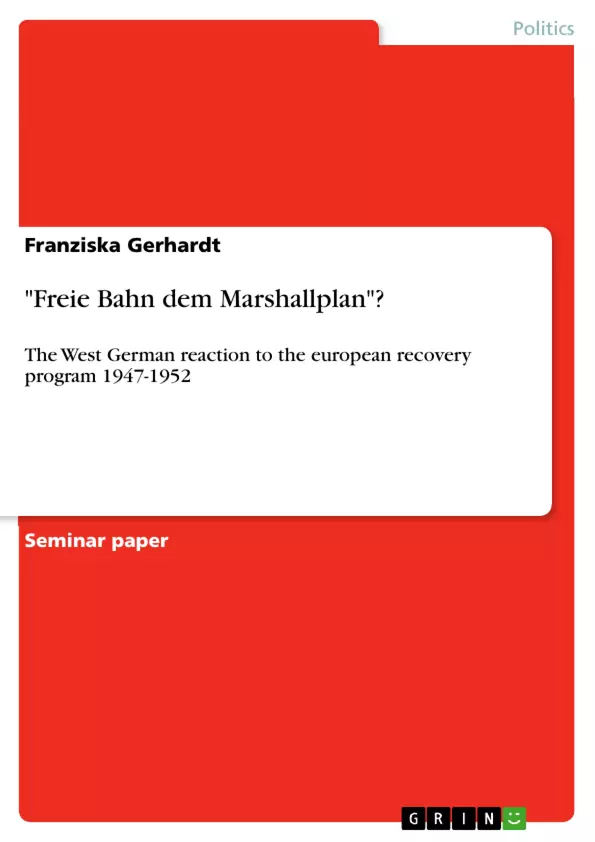On 5 June 1947, the US-Secretary of State, George C. Marshall, in his later famous speech at Harvard University proposed a reconstruction program for Europe. Ten months later, on 2 April 1948, the Foreign Aid Act was passed by the US Congress. Thus, the European Recovery Program (ERP), more commonly called the “Marshall Plan”, came into effect. It was the biggest ever project of international economic cooperation in times of peace. Between 1948 and 1952, the goods and services provided for Europe by the U.S. amounted to 13 billion dollars . Sixteen European nations took part in the program, and West Germany, after Great Britain, France, and Italy, was the fourth biggest receiver of American support . This money played a crucial role in creating the West German “Wirtschaftswunder” and integrating the country into the West.
Much has been written about the Marshall Plan, also from a German perspective. Its development, the institutions organising it and its consequences have all been described in detail by political scientists and historians alike. This paper sets a different focus and concentrates on the West German reception of the Marshall Plan. How did the West Germans react to the European Recovery Program, only three years after their ultimate defeat, with their economy destroyed, their cities bombed to rubble and their collective conscience having by no means confronted the guilt of Fascism? Was it really all “Freie Bahn dem Marshallplan ”?
Up to now, this very aspect has been nearly unexplored, so there is not much literature about it. In any case, I have tried to base my essay on as many sources as possible to be able to offer a balanced analysis, my main sources for the German perspective being the books and articles by Berghahn, Foschepoth, Pommerin, and Wagner . The essay is structured in such a way that, after a brief introduction to the subject, the German reception of the Marshall Plan will be overviewed in three different areas: The reactions in the press, the reactions in the opinion surveys that were conducted by the American occupation forces from 1946 onwards, and finally the viewpoints of the political parties. Subsequently, an attempt to explain the German reception will be provided by taking a closer look at the situation in Germany before the Marshall Plan and by analysing the different German fears and concerns about American economic policy, before coming to a conclusion. The time frame of the essay spans from 1947 to 1952.
Inhaltsverzeichnis (Table of Contents)
- Preface
- The Marshall Plan – An Introduction
- The German Reaction to the Marshall Plan
- Preliminary Remarks
- German Reactions - The Press
- German Reactions - The Surveys
- German Reactions - The Viewpoints of the Parties
- The German Reception - Attempting to Explain
- The Situation in Germany before the Marshall Plan
- German Fears and Concerns
- Conclusion
- Literature
- Other sources
Zielsetzung und Themenschwerpunkte (Objectives and Key Themes)
This paper explores the West German reception of the Marshall Plan, focusing on how the West German population reacted to the European Recovery Program in the years following World War II. It examines the reactions of the press, opinion surveys, and political parties, and investigates the reasons behind these reactions, considering the situation in Germany before the Marshall Plan and the fears and concerns of the German people about American economic policy.
- The West German reaction to the Marshall Plan
- The influence of the Marshall Plan on the West German economy
- The political and economic objectives of the Marshall Plan
- The role of the Marshall Plan in the Cold War
- The different interpretations of the Marshall Plan in Germany
Zusammenfassung der Kapitel (Chapter Summaries)
- Preface: This chapter introduces the Marshall Plan and its significance in the context of post-war Europe. It highlights the crucial role of American aid in rebuilding the West German economy and integrating the country into the West.
- The Marshall Plan - An Introduction: This chapter discusses the different interpretations of the Marshall Plan among historians, examining arguments ranging from American generosity to economic imperialism. It emphasizes the importance of understanding these interpretations in relation to the German reception of the Plan.
- The German Reaction to the Marshall Plan: This section presents an overview of the German reception of the Marshall Plan, focusing on the reactions of the press, opinion surveys, and political parties.
- The German Reception - Attempting to Explain: This chapter attempts to explain the German reception of the Marshall Plan by considering the situation in Germany before the Plan and analyzing the German fears and concerns about American economic policy.
Schlüsselwörter (Keywords)
The key words and focus topics of the text include the Marshall Plan, European Recovery Program, West German economy, Cold War, American influence, German reception, and political and economic objectives of the Marshall Plan.
- Quote paper
- Franziska Gerhardt (Author), 2004, "Freie Bahn dem Marshallplan"?, Munich, GRIN Verlag, https://www.grin.com/document/87484



